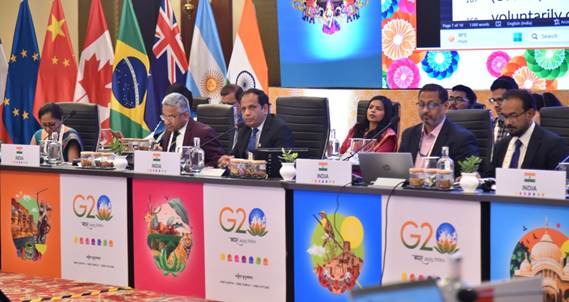G20 gathers leaders in international agricultural research in Brasília
G20 gathers leaders in international agricultural research in Brasília
From May 15 to 17, the headquarters of Brazil's Federal Data Processing Service (Serpro) will welcome representatives of scientific institutions that work with agricultural research worldwide. The Meeting of Agricultural Chief Scientists of G20 states (MACS-G20) being organized by Embrapa will have the motto “building a more just world and a sustainable planet” and include discussions about the role of science in food security, climate change and the fight against hunger.
This year, Brazil chairs the G20, a group of 20 countries that represent the world's leading economies. Such leadership involves hosting meetings between the leaders of different areas throughout 2024, and MACS is the branch of the G20 that works on scientific issues related to agriculture.
MACS annual meetings are opportunities for the exchange of information and for the alignment of research efforts among participating countries. The meetings are formed by technical representatives of the institutions and are closed to the public. At the end of each session, a spokesperson releases the resolutions and following steps to be taken. The topics to be discussed this year include “Routes to food security through science”; “The perspective of science in the context of climate change emergency”, “Food security and agrifood systems”, “Global scientific advances to enhance food security and adaptation of agrifood systems”, “Strategies to foster adaptation and resilience of agrifood systems”, “Bioeconomy and agriculture in the context of the Global Alliance against Hunger and Poverty”.
"The event will be a major opportunity for Brazil to showcase solutions and products that our national science has developed on all these topics, such as ICLFS, bioinputs, agricultural climate risk zoning, tracking techniques, and others. Technologies that can be applied in other parts of the world and keep Brazil at the forefront of sustainable agriculture and food security," stated Embrapa's president, Sílvia Massruhá.
HQs of the Federal Data Processing Service (Serpro), in Brasília, DF, Brazil, being prepare for the events of MACS G20-2024. Photo by: G20 Brasil Audiovisual TEam
The head of Embrapa's International Relations, Marcelo Morandi, spoke about the role of science in addressing global challenges. “In the meeting, we will discuss the role of science and scientific cooperation to achieve sustainable agrifood systems in specific local, national and global contexts. Such systems play a fundamental role in economic growth, in the fight against hunger and poverty, in supporting social inclusion, and in protecting the environment,” Morandi stressed.
Morandi, who has been appointed technically responsible for the event, says that the MACS-G20 aims to answer how science can help reduce vulnerabilities and improve resilience in agrifood systems, and how scientific work can support smallholders and traditional peoples, with due respect to the knowledge and contexts of those communities.
"Brazil offers strong agricultural science for tropical environments. The set of good practices developed here can be part of the solution for the global polycrisis we face. We believe that building a just world and a sustainable planet is possible with science and cooperation," states Morandi, recalling that the topics addressed in the MACS-G20 are in line with several goals of the 2030 Agenda for Sustainable Development launched by the United Nations (UN).
The start of the G20 agricultural research forumMACS-G20 in 2023, held in India. Photo: Press Information Bureau. Once launched in 2011 and initiated the following year, MACS was a response from G20 member countries to the range of major challenges that the planet had already been facing in the area of food security and that required a response from scientific research and innovation systems. The goal was to combine agricultural research and innovation strategies and propose new forms of international cooperation. Since its inception, the group has focused on issues like adequate food supply for the whole planet; reducing food waste and loss; digital and precision technologies; fighting the spread of agricultural diseases and pests; encouraging investment in agricultural research and innovation; protecting biodiversity and local production systems; climate change adaptation and mitigation; and diversification of agri-food systems' value chain. |
Fábio Reynol (MTb 30.269/SP)
Embrapa, Superintendency of Communications
Press inquiries
imprensa@embrapa.br
Translation: Mariana Medeiros (13044/DF)
Embrapa, Superintendency of Communications
Further information on the topic
Citizen Attention Service (SAC)
www.embrapa.br/contact-us/sac/



